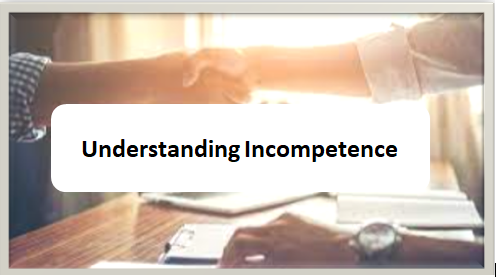In a world where performance and efficiency are increasingly valued, the understanding incompetence concept of incompetence often has a strong negative connotation. It can usually be associated with failure, weakness, or lack of ability. But incompetence is a hidden human tendency that goes far beyond mere underperformance — to understand and address it constructively, we must delve deeply into its causes, manifestations, psychological components, and strategies that can transform it into growth.
What Is Incompetence?
Incompetence can be defined as the failure to perform a task or fulfill a responsibility effectively due to insufficient knowledge, skill, judgment, or motivation. It can manifest itself in any area of life, whether academic, professional, social, or personal.
The important thing is that incompetence is not always a permanent condition. Many individuals who initially demonstrate incompetence in a particular area. Can improve over time with help and learning—recognizing this potential for growth is crucial to responding with empathy and workable solutions.
Types of Incompetence
Psychologists often refer to a four-stage model of competence that explains how people can go from ignorance to mastery:
Unconscious incompetence: Individuals become unaware of their lack of ability, which is the most dangerous stage because the person may act with false confidence.
Conscious incompetence: The individual becomes highly aware of their skill gaps and is aware of their limitations.
Cognitive ability: The individual can perform the task, but it requires a great deal of concentration to do it effectively.
Subconscious Ability: The skill becomes second nature and the individual can perform it with ease.
Understanding where someone falls within this framework goes a long way in determining the right support and training approach.

Causes of Incompetence understanding incompetence
Incompetence rarely arises from a single problem; it is usually the result of multiple other factors, including:
- Lack of Education or Training
Many people are given responsibilities without proper information and preparation. For example, promoting an employee to a understanding incompetence management role without leadership training may fail.
- The Dunning-Kruger Effect
This cognitive bias occurs when people with less ability overestimate their own abilities. Ironically, those who are the least capable are often the least aware of it, making it difficult to self-correct.
- Lack of Experience
Skill mastery often comes with repeated exposure. An inexperienced employee may need more time and guidance to become competent.
- Cognitive and Psychological Barriers
Conditions such as ADHD, anxiety disorders, or learning disabilities can understanding incompetence greatly affect a person’s ability to process information, make decisions, and perform tasks effectively.
- Poor Motivation or Burnout
Lack of interest or emotional exhaustion can derail even the most capable people. Burnout often leads to distractions, forgetfulness, and careless mistakes.
How to Address Incompetence
Make an honest livelihood assessment. Is the person failing due to lack of knowledge, skills and attitude or financial factors?
Use tools like:
Skill assessments
Performance reviews
360-degree feedback
- Provide Constructive Feedback
Effective feedback is:
Specific: Address the issue directly (“Your reports contain data inconsistencies” rather than “You’re careless”).
Timely: Don’t wait months to address an ongoing problem.
Solution-oriented: Focus on what can be done better.
Conclusion
Incompetence is not a flaw in critical thinking. It is often a symptom of non-systemic psychological and developmental problems. When viewed through the lens of development, it becomes an opportunity for individuals to learn, for the organization to improve, and for teams to collaborate more effectively.
By understanding the roots and symptoms of incompetence, we can transform underperformance into capability by responding with compassion, strategy, and accountability. Whether in personal development, education, or the workplace. The journey from incompetence to competence is not only possible, but essential for meaningful growth.






Leave a Reply